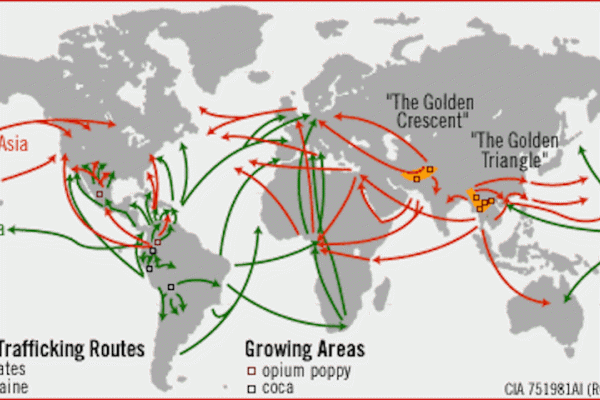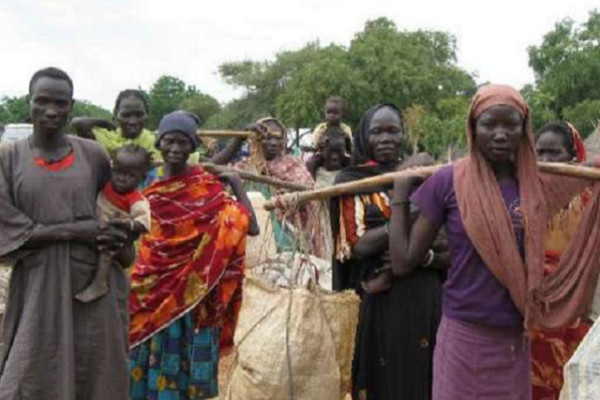This fascinating but ultimately very concerning lecture was given to a packed ISG audience by Antonio Maria Costa, former Executive Director of the UN Office on Drugs and Crime (UNODC) and former Director General of the UN in Vienna (UNOV) from 2002 to 2010.
He started by showing a graph indicating the fact that the consumption of illegal drugs has more than doubled in less than 30 years. His slide presentation was self-explanatory and was divided for clarity into various drug categories – cannabis, amphetamines, opioids, cocaine and heroin. The figures presented are truly alarming. In terms of consumption, cannabis (the most used drug worldwide) 219 million users, amphetamines 36 million, opioids 60 million, cocaine 22 million. The one with the most severe health consequences is opioids which in the space of some ten years has seen the biggest increase. Three-quarters of consumers of opioids are men whereas the “softer” drugs are consumed by an equal proportion of men and women.
He then went on to talk about the areas in the world where these various drugs were consumed the most. Cannabis consumption is very prevalent in North and South America; cocaine, the drug of choice for a wealthier cohort, Europe and America. What he termed “drugs of concern” included heroin consumption in Southeast Asia.
While cocaine is sniffed rather than injected, the number of people who inject drugs is mainly in North America (3.4 million) and perhaps not surprisingly, Russia (1.7 million). Unfortunately, Africa is fast catching up in this ghastly race to the bottom.
Deaths, either directly or indirectly due to drug consumption, are about half a million per year. In just 30 years, this figure has doubled. He was also shocked and saddened by the years of healthy life lost – years that people do not contribute to society as they are unable to work or be productive.
He next turned to the question of supply and demand. In other words, the quantities of drugs seized. This he said was a drop in the ocean and mentioned 200 tonnes of heroine and 15,000 tonnes of cannabis. Due to an increase in vigilance, many drug dealers have now switched to meta-amphetamines which are chemically manufactured and thus far more difficult to trace the origin and far more unpredictable in terms of drug content. Southeast Asia is the main region for the tremendous increase in the production of this new synthetic drug which is then exported to Europe, USA, China, Australia and other Southeast Asian regions.
Cannabis, what he termed a “leisure drug” is grown over an estimated 300,000 hectares inColumbia, Mexico and other countries in Latin America. There has been a 16% increase in production. There is an estimated 22 million users worldwide representing a staggering 42% increase in production. The trajectory of drug transportation goes via Africa to Europe and North America. And it is an easy route. Drugs in containers leave from the western coast of Africa where there are few controls, where the ships travel at night and cover their suspicious cargos with tarpaulins. The routes chosen are so busy with drug trafficking and more innocent shipping that recently a large yacht actually crashed into a container carrying drugs.
Who are the big consumers of cocaine, the drug of preference of the more well-off? Out of the 22 million users, 6 million in the USA, four and a half million in Europe, etc. This is not consumed in large quantities in Asia except for Australia. Cannabis has been made legal in many American states and in Portugal. The latter country actually experienced a drop in consumption of illicit substances since giving it legal status.
As for the production of opium and heroin, the large amount in 2022 came from Afghanistan. However, since the takeover by the Taliban, poppy production has been banned and some farmers have resorted under pressure to grow wheat instead with poppy cultivation dropping by 95%. This crackdown (excuse the pun) has made the problem even worse as many farmers have switched to “kitchen” production of methamphetamines also known as speed. This is difficult to track down but is somehow exported to Turkey and Europe. Poppy cultivation was happily taken over by Iran.
An interesting development has recently occurred in Myanmar. In the west, where the military junta still rules, there is little cultivation of opium. However, in the east where many insurgent and anti-junta groups are active, these groups support themselves financially by growing opium and exporting it to China. This could have enormous political consequences.
Some members of the audience asked why the great killers, alcohol and tobacco, are not considered illegal drugs. Simply put, these bring in much needed taxes to the various governments. Recently, the WHO tried to ban tobacco consumption but there were too many vested interests, and it was not a success. Not only is the mafia involved but also some banks who actually manage to launder drug money and, in some cases, get away with it.
What can we do to stop this untenable and terrible situation? Mr Costa did not think that repression or terms in jail were the answer. What we really need, he said, was a change of culture. Many people turn to drugs as an escape from the ever increasing stress and uncertainty in today’s world. As long as drugs feed into humanity’s greed and poverty, this problem will never besolved. What does work is education. He cited as an example of good policy is what happened in Sweden where extensive drug education was introduced in schools with success. 80% of Swedish students surveyed said they understood the dangers of illegal drugs and report 15% usage whereas in Italy, where there is no drug education in schools, only 20% of students surveyed said they understood the danger with 45% usage among young people.
So even if your no drugs policy is a positive one, there are always other addictions waiting round the corner to replace some existing drugs. The latest is the increase in so-called vaping which is supposed to replace cigarette consumption but is now being aimed at the very young. Tobacco is such a killer that the world should regret the day that Sir Walter Raleigh brought back tobacco from the New World and turned it into an acceptable recreational drug.



